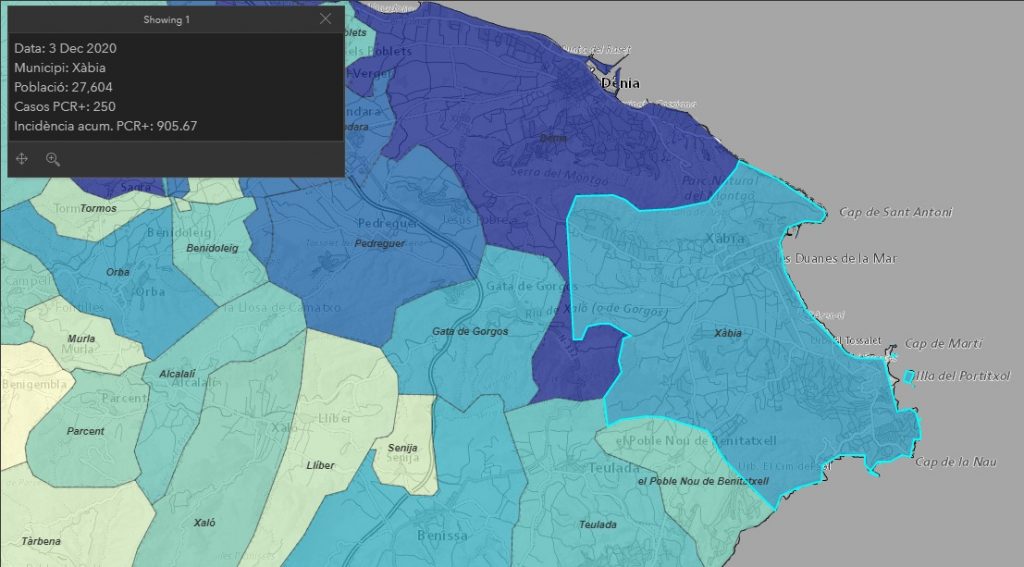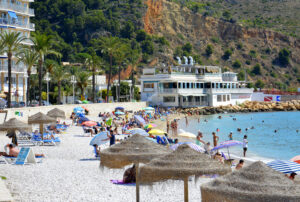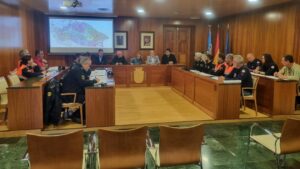13 new infections in Xàbia; 70 in the Marina Alta – the end is not nigh
The Valencian region continues to fight the infection and battle to lower the highest positivity rate in the country.

Friday 4th December 2020 | MIKE SMITH
This is the latest information on the status of the health situation in Xàbia, the Marina Alta, the Comunidad Valenciana and across Spain.
For more information, please refer to the links given at the bottom of the page as our report is based on the official figures given in these sources.
Xàbia
Xàbia has recorded 13 new infections confirmed by PCR test since the last update with the total number of infections rising to 250 since the crisis began. Consequently, the 14-day cumulative rate (IA) has dropped, now standing at 97.81 new infections per 100,000 inhabitants. The death toll remains at 3.
Marina Alta
The Dénia Health Authority, which covers almost all of the Marina Alta region, has recorded 70 new infections since the last update, the biggest rise since November 5th, bringing the total to 2,045 positive cases since the crisis began.
The 14-day IA rate has risen to 99.57 new infections per 100,000 inhabitants, the lowest since the end of October. The rate is the still second lowest rate in the whole Comunidad Valenciana, after Manises (78.18).
The death toll in the Marina Alta remains at 37.
The new infections have been recorded in the following municipalities:
- Dénia – 21
- Xàbia – 13
- Calp – 8
- Pedreguer – 7
- Gata de Gorgos – 5
- El Vergel – 4
- Ondara – 3
- Pego – 3
- Teulada – 3
- Els Poblets – 1
- Llíber – 1
- Xaló – 1
Comunidad Valenciana
The data for the Comunidad Valenciana confirms that the region is still fighting the infection and still has the highest COVID-19 positivity rate in the country – 14.30% – which is double the national average. As of yesterday’s update, the 14-day IA rate is 238.18 new infections per 100,000 inhabitants; the Valencian region can no longer boast the lowest rate on the mainland as Madrid, Cataluña, Galicia, Extremedura and Murcia have all recorded lower figures.
The IA rates across all 24 health authorities have fallen since the last update and, on average, there has been a 3% drop in the rate over the past 14 days. It’s a small decrease but one that’s moving in the right direction.
Ximo Puig, president of the Generalitat Valenciana, warned that the bulk of the restrictive measures will remain in force in the region until after the Christmas holidays. “We need to defeat the virus definitely and for that to happen we need to continue with the restrictive measures.” The current measures are due to expire on December 9th, but the regional government will be publishing new restrictions to come into force the following day which will include details of land border closures, the night curfew, capacity and opening schedule limits for bars, restaurants and shops, as well as restrictions of ceremonies and events. The closure of nightlife venues is likely to continue for at least one more month into the New Year.
Spain
Nationwide, the 14-day IA rate continues to drop and now stands at 240.89 new infections in 14 days per 100,000 inhabitants, a 47% drop in the past 14 days. Encouraging. The majority of autonomous communities and enclaves saw their rates drop over the weekend, with Ceuta, Andalucia, Extremadura, Cantabria, Cataluña, Murcia, País Vasco, Aragón, Navarra, and Castilla-La Mancha, all experiencing decreases of over 50% in the past two weeks. The highest rate is in the city enclave of Melilla (374.62) and the lowest in the Canary Islands (84.38), although this is their highest rate for several weeks.
The Spanish Government has issued recommendations for the festive period, agreed by a meeting of central and regional officials, but the message is clear: stay home at Christmas to avoid a third wave of infections in the New Year. Regional governments, including the Generalitat Valenciana, will be confirming specific restrictions in due course.
Several experts have warned that increased social contact during the festive period is almost certainly going to lead to new outbreaks in January and the only way to avoid that would do follow Italy’s lead and cancel Christmas. (The Italian government has recently prohibited the celebration of midnight mass on Christmas Eve and limited travel between regions over the festive period; in addition, a night curfew will begin at 10.00pm.)
COVID-19 C.Valenciana: Monitorage de la Situació
Ministero de Sanidad: Actualización nº 264 (03/12/2020)
El Pais



